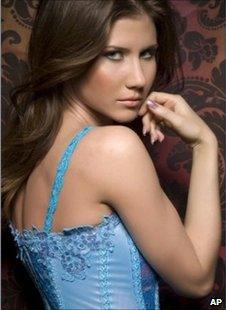Russian spy Anna Chapman is stripped of UK citizenship
- Published

Russian spy Anna Chapman was married to a British man
Anna Chapman, one of the Russian spies deported from the United States, has been deprived of her British citizenship, the BBC understands.
She has lost her British citizenship and exclusion is expected to follow, meaning she cannot travel to the UK.
Ms Chapman was among 10 Russians arrested in the US who admitted to being agents for a foreign country.
Last week her lawyer said she would like to come to the UK as she has a UK passport through a previous marriage.
Russia agreed to exchange four US spies for the 10 Russian agents and the swap was carried out in Vienna on 9 July.
Ms Chapman, who is also known as Anya Kushchenko, is the daughter of a Russian diplomat.
Until the Home Office's decision, she had dual Russian-UK nationality.
BBC home affairs correspondent Andy Tighe said Ms Chapman became the best-known of the Russian spy ring after details and photographs from her Facebook entry were picked up by newspapers around the world.
Vienna spy swap
He said her lawyers were handed a letter formally revoking her citizenship and she was told her passport was no longer valid.
It is understood steps are also being taken to permanently exclude Ms Chapman from travelling to the UK in the future, our correspondent said.
Earlier this month, Briton Alex Chapman, 30, from Bournemouth, Dorset, talked to a newspaper about his four-year marriage to the 28-year-old Russian.
He said they had met at a party in London in 2002 and married five months later.
He said she changed dramatically during the marriage, and by the end was having "secretive" meetings with "Russian friends".
Ms Chapman did not seek to conceal her Russian identity when she arrived in New York from Moscow in February 2010, saying she wanted to build up a recruitment agency targeting young professionals in both cities.
But following the Vienna spy swap, a Home Office spokesperson had said they were reviewing Ms Chapman's passport situation.
"The home secretary has the right to deprive dual nationals of their British citizenship where she considers that to do so would be conducive to the public good. This case is under urgent consideration," the spokesperson said.
Shadow home secretary Alan Johnson had said it "cannot be in our interests" to let Ms Chapman settle in the UK.
The BBC's Dominic Casciani said only half a dozen people have been stripped of British citizenship since the law was introduced in 2002. The law was partly introduced to make it easier to deport radical cleric Abu Hamza al Masri.
The home secretary can strip someone of citizenship if their presence is "seriously prejudicial" to British interests: for example, if they are a threat to national security.
The 10 Russian agents had pleaded guilty in New York to "conspiracy to act as an unregistered agent of a foreign country".
More serious money-laundering charges against them were dropped.
Prosecutors said the accused had posed as ordinary citizens, some living together as couples for years, and were ordered by Russia's External Intelligence Service (SVR) to infiltrate policy-making circles and collect information.
On Sunday it was reported that two of the four Russians expelled from Moscow as part of the spy swap were believed to be staying undercover in a British hotel.
The brother of one, Igor Sutyagin, said he had called his wife from a small town on the edge of London, but had not been told exactly where he was.